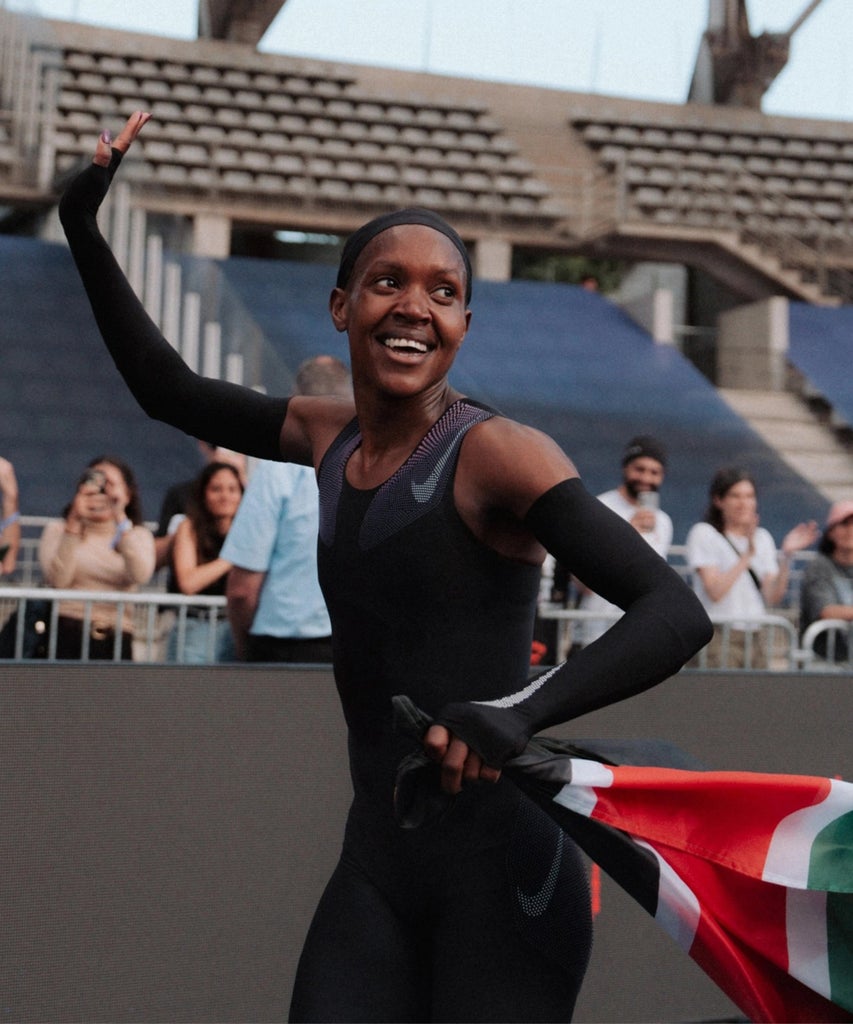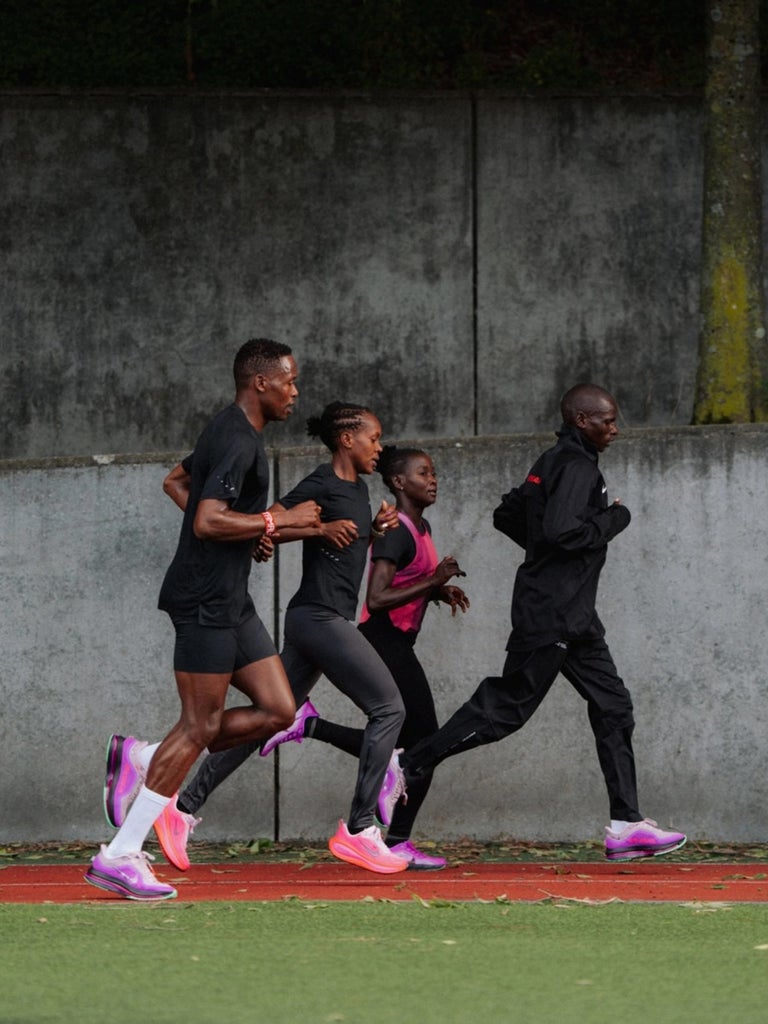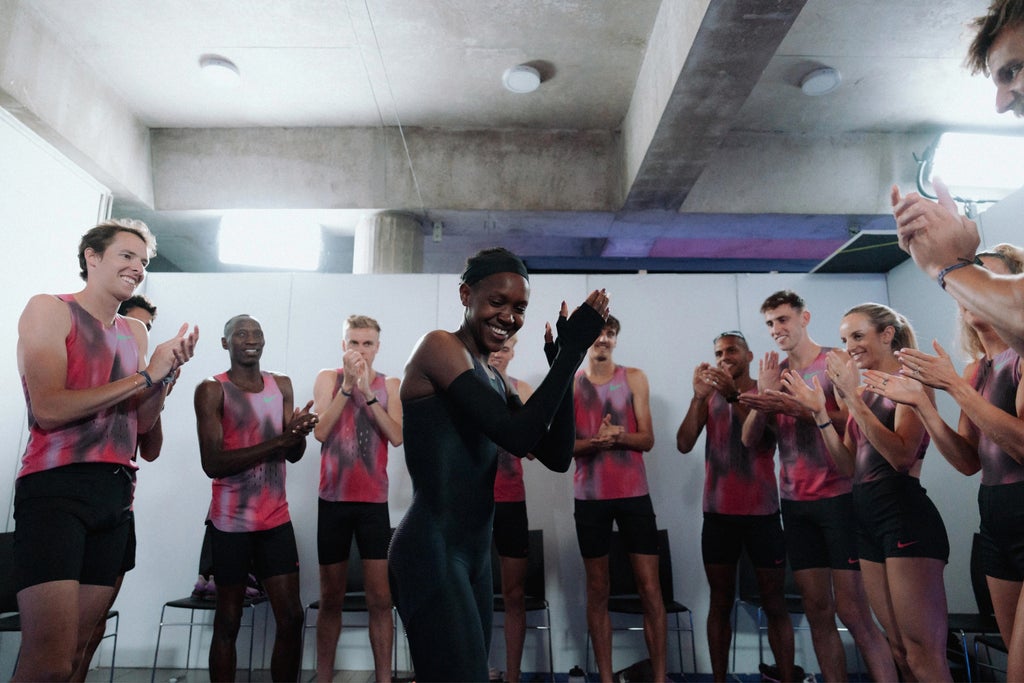
“It’s good to be tired after you’ve done something special,” said Kenyan, three-time Olympic champion, Faith Kipyegon to Unbothered, smiling ear to ear. When we spoke, it had been less than 24 hours since Faith Kipyegon attempted to become the first woman ever to run a mile in less than four minutes. On June 26, Faith’s “moonshot” attempt took place at Nike’s dedicated “Breaking4” event at the Stade Charléty in Paris. And the result? A turbo-charged 4:06.42. For the uninitiated to the world of athletics, she ran roughly around 15 miles per hour. While she didn’t break the four-minute mile, Faith Kipyegon beat her own world record (4:07.64) and ran the fastest mile a woman has ever attempted — again. As I sat with one of the world’s greatest middle-distance runners in Nike’s Parisian showroom, surrounded by photos of her decorated athletic career, I agreed with Kipyegon that she has every right to honour being tired in this moment.
“I would say I got what I wanted,” she explained when I asked how she felt about not “breaking 4”. “To execute as fast as I did yesterday was the best I wanted. I didn’t hold anything like regret after the race [or thought that] I could have done this better. For me, I gave it all yesterday, and I will keep on trying.”
To read some of the headlines that followed the Breaking4 attempt, you’d think Faith Kipyegon hadn’t just made history in the French stadium last Thursday. ‘Faith not enough as Kipyegon misses four-minute mile barrier by six seconds’, read the Guardian’s headline. ‘Kipyegon falls short in sub-four-minute mile bid’ wrote the BBC, and ‘Faith Kipyegon fails in bid to become ‘female Roger Bannister’ per The Times. Though factually correct, the words “fail” and “falls short” are far from Kipyegon’s reality as an athlete.

It’s a sad but common story for women, especially Black women, to be the best in the world yet find the focus aimed at what you didn’t achieve, rather than what you did (just ask Simone Biles and Serena Williams). It has long been considered by some scientists and sporting experts that a woman can’t run a sub-4-minute mile. As running experts examined and scrutinised Kipyegon’s efforts lap by lap, second by second, I marvelled at the Kenyan woman behind the incredible metrics; who as a child in Kenya would run 4 kilometres to school while barefoot, who began competing on an international stage at just 16-years-old, who ran the fastest recorded mile by a woman, who is just six seconds closer to pushing the boundaries of what women athletes are said to be able to achieve. Faith Kipyegon, as she would say, “dared to try” the impossible — and came exceptionally close.
I was lucky to be in the stadium as Faith Kipyegon made her historic bid for a sub-4 mile. Between fans screaming her name, the looming clock and the global livestream, there was something palpably electric (and truly nerve-wracking) watching Kipyegon take her place on the track alongside 13 world-class athletes, pacers who were positioned to help push Kipyegon forward. Of the 13 pacers, 11 were men; in basic terms, they were chosen to shield Kipyegon from the wind so she could run faster, and since she is the fastest woman in the mile, male pacers — who can sustain a faster pace —were needed to keep up and support her attempt. The culmination of months of highly strategic training, custom, one-of-a-kind, aerodynamic running gear developed by Nike, and elite training came down to those crucial minutes. It was electrifying to watch.

At 31 years old, and mum to 6-year-old daughter, Alyn, Kipyegon has often addressed the spoken and unspoken limitations placed on athletes who become mothers (specifically mothers, because let’s face it, fatherhood isn’t considered a limitation in the same way). “This was a message to young women out there, to young mothers out there — everybody out there! — to know that we are limitless in this world,” she shared, suddenly serious. “You know, we can limit ourselves [in our] thoughts, but we can just go out there, explore and do anything in this world.”
“For me, [it’s about knowing] that my daughter is back at home, knowing that I’m out there inspiring the next generation… When she grows up, she will know mum was up to something which was for the whole world.”
fAITH kipyegon
When a top athlete becomes a mother, they quickly become subject to probing questions about the future of their careers and what their prospective comeback could look like — and whether they’ll make one at all. To say the quiet part out loud: many athletes have previously felt that choosing to have a child meant having to quit. The reality of women’s sports has meant uncertainty about paid maternity leave, insecurity over sponsorship contracts and support during and after pregnancy, not to mention facing old-fashioned assumptions about what a woman’s body can achieve after birth.
Faith Kipyegon is part of a well-established club of mothers (including the likes of Serena Williams and Shelly Ann Fraser-Pryce) who continued to achieve in their athletic careers in motherhood and are also vocal about increased support for women in sport.
“We can push ourselves as women,” Kipyegon said confidently. “We can inspire the other women in the world that whether you are a doctor or a nurse, or anything, you still have to go there and work.
“You have a baby, yes, but you still have to go there and do what you have to do,” she added. “So for me, [it’s about knowing] that my daughter is back at home, knowing that I’m out there inspiring the next generation… When she grows up, she will know mum was up to something which was for the whole world.”
By now, a lot’s been said about the magnitude of Kipyegon’s moonshot and how it will inspire a next generation of women in sport to also dare to try. Brands like Nike are increasingly investing in women’s athletics, and I was told by Nike’s VP of Global Women’s Marketing, Tanya Hvizdak, that they’ve invested “equal parts” in women as in men’s track and field athletes, following athletes’ demands for visibility and equity. However, even a momentous moment like Breaking4 doesn’t always lead to women’s increased participation in sport.
In the UK, young Black girls are said to show the most interest in sport, but “48% of Black girls drop out of sport as a teenager”. This research by the Women In Sport organisation, released earlier this year, reveals Black girls are being failed by a system that “pushes Black girls away from sport, despite their overwhelming passion for it.” I wonder what seeds were planted in the mind of a young Black woman or girl who watched Kipyegon cross the finish line and make history. Will they dare to try, too?
I had many more questions for Faith Kipyegon than our five-minute conversation would allow. We briefly spoke about her love for her home, Kenya, a country that continues to produce athletes, such as Eliud Kipchoge, who push our understanding of human potential. It’s also here where the Kenyan philosophy of “harambe” — loosely meaning to all pull together — became embedded in Kipyegon’s training and mindset. “We can fly our Kenya flag in the world. I’m so so proud of my country,” she said, beaming.
As for her legacy, Kipyegon is keen for another attempt at breaking4. She’s far from finished. And still has, of course, faith.
“As I said yesterday, if it is not me, [the sub-4] will be broken by a woman. One day, one time.”
Like what you see? How about some more R29 goodness, right here?